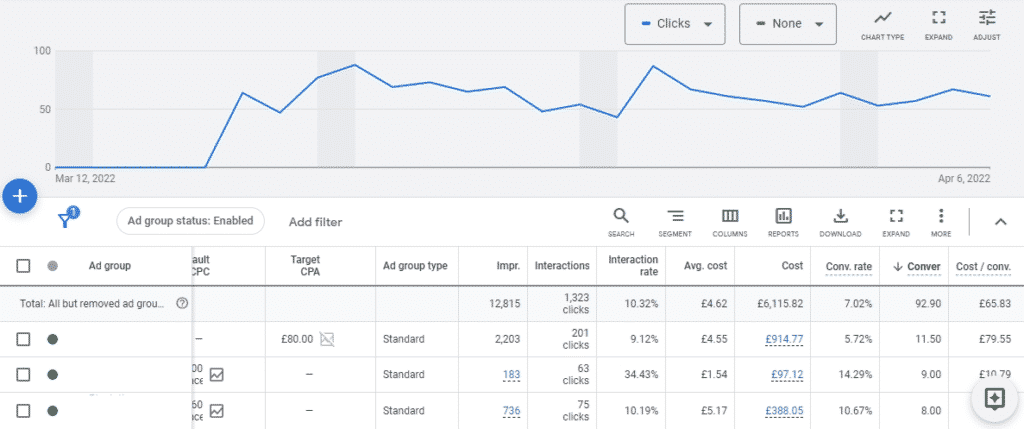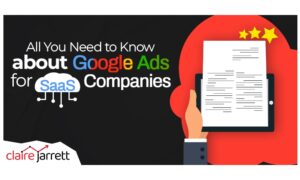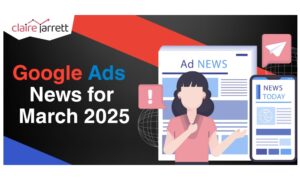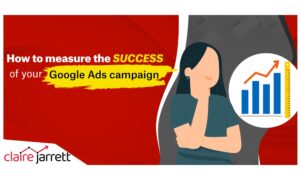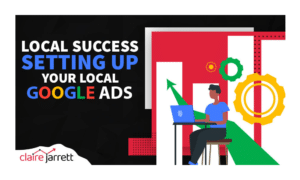Are Google Ads Worth It in 2025?

Last Updated on: 30th June 2025, 10:40 am
It’s really easy to find out if your market can be targeted with Google Ads, you just need to use the Keyword Planner tool to identify potential keywords, the Cost Per Click, and how often the keywords are being searched for.
But does that really tell you if it’ll be worth it for your business? Today, I’ll leverage my 15+ years of Google Ads experience to help you answer the ultimate question: are Google Ads worth it?
Let’s dive in!
Let’s Be Clear: What Google Ads Can(not) Do for Your Business
Google Ads isn’t a silver bullet, so before we get started, I want you and me to get clear on the things you can reasonably expect from a well-optimised Google Ads campaign vs what it cannot help you with.
Google Ads Can Help Your Business with:
- Increasing your visibility and reach
- Generating leads and sales
- Driving targeted traffic
- Measurable results
- Reaching the leads who have visited your website without converting
However…
Google Ads Can’t…
- Guarantee immediate success
- Fix a bad product, service, or offer
- Replace SEO
- Convert leads if you have a poorly-optimised website or landing page
- Provide a “set-it-and-forget-it” solution
So, What Can I Realistically Expect from Google Ads?
Provided that you understand your audience, have a good website with a fleshed-out value proposition, and are willing to understand how to best reach them, you can expect Google Ads to:
- Increase your website traffic – Your mission will be to fine-tune your campaigns to ensure that traffic is targeted and comprised of your ideal prospects.
- Convert leads according to your targeting, offers, and landing pages – As I said, Google Ads aren’t a silver bullet to help with a poorly thought-out offer. It will only produce results as good as your inputs. Typically, conversion rates average from 1% to 5%.
- Change over time – In practice, this means you can’t turn it on and forget it. As consumer preferences change and as the platform evolves, you will need to stay updated to use the best practices to grow your ROAS.
Are we on the same page now? Great, let’s dive in!
1. The Pros of Using Google Ads
Google Ads Offers Unparalleled Reach and Increased Brand Awareness
What do you do when you want more information about something? You Google it.
What do you do when looking for the best sofa in your budget range? You Google it.
Google satisfies every type of intent, allowing you to reach your target audience through its 8.5B searches daily. No matter what you’re selling, if someone is Googling it (and chances are – they are), your ads will be able to reach them. Not only does this mean a conversion boost, but it also helps with increasing your brand awareness.
How Google Ads Improve Brand Awareness
Since you’ll be showing up in front of audiences interested in your industry, you’ll start to build trust and brand recall, making them more likely to click on your other results (e.g., blog posts) once they see you.
You Can Scale Quickly
Most businesses that want to reach their revenue goals quickly use Google Ads – for a good reason. It takes time to grow your social media following or mailing lists – the same goes for SEO and content.
Google Ads results are immediate; the only thing that can hold you back is your lack of PPC expertise and budget.
For example, once you’ve identified the critical touchpoints in your ideal customers’ buyer’s journeys, you can launch a Performance Max campaign to reach your prospects across different channels (including Google Ads for YouTube).
Target Your Competitors Directly with Google Ads
When is your ideal prospect ready to consider your product? When they’ve just started exploring your competitors.
Now, you could use organic content. Or you could employ Google Ads competitor brand name campaigns to intercept the searchers when they’re exploring your competition to explain why your offer is much better.
Google AdWords Is Very Cost-Effective (When Done Right)
On average, you get $8 for every $1 you spend on Google Ads.
However, with the right strategy, you can increase the returns even more.
For example, even if your industry average CPC (Cost Per Click) is $2, you can reduce it by increasing your ad’s Quality Score.
Similarly, if you track Google Ads conversions, you’ll be able to optimise your Google Ads campaigns in just a few months to use the Target ROAS (Return on Advertising Spend) bidding strategy. With tROAS, Google Ads will optimise your bids to find the best-quality prospects for the lowest price.
There are a lot of little mechanisms in the platform that you can leverage to get better campaign results at a lower price (including the free ad credit promotions). However, you will need to give Google Ads the time to learn from your campaigns and have a sizeable budget.
Learn more: How to lower your Google Ads CPC
Understand How Your Market Feels Sooner
You need insights when you first launch a product (or when you want to test your strategy). The sooner you get them, the better.
And with new Google Ads features, you can even use your existing top leads to find other people similar to them.
With the proper budget, you can get insights faster.
However, keep in mind that if you’re a new advertiser, it’ll take a while for your campaigns to undergo the learning period (30-60 days). After that, you’ll see the full revenue potential.
Learn more: How fast do Google Ads work?
You’ll Get Even Better Results When You Optimise Your Campaigns
The first few months in your Google Ads dashboard are a learning experience – for both you and the Google Ads algorithms. But as you grasp the foundations and get conversion data, you’ll be in an excellent position to start optimising your campaigns to increase your ROAS:
- Are your keywords working for you? – Get rid of all the keywords that aren’t profitable or don’t bring in any conversions. Focus on relevant, high-intent keywords, strengthen your negative keywords lists, and keep a close eye on your match types.
- Optimise your landing pages – Make sure your landing pages match the searcher’s intent and perform CRO and A/B testing experiments to maximise your conversions.
- Group keywords into relevant ad groups – Organise related keywords into tight ad groups for more targeted ads.
- Leverage ad extensions like site links, callouts, and location extensions to improve ad visibility and CTR.
- A/B test ads to see which versions perform best.
- Adjust bids based on performance – Regularly review bids and adjust based on keyword performance and ROAS.
- Monitor Quality Score – Improve your Quality Score by focusing on ad relevance, landing page experience, and CTR.
- Set clear goals and KPIs to track your performance and improve.
This is just the tip of the iceberg, but as you start to optimise, you’ll get a sense of where you need to look first!
2. The Cons of Using Google AdWords to Promote Your Business
Google Ads Success Takes Time (and Management)
Remember when I mentioned the campaign learning period? Good Google Ads campaigns take time and effort. Even though there are plenty of automations and automated recommendations, you can’t let Google manage your campaigns for you.
You need to be there at every step, from keyword and customer research to applying your insights to increase your campaign ROI (and measuring success all the while).
How to Measure the Success of Your Google Ads Campaigns
Measuring Google Ads success is quite simple, as we’ll look at the key metrics:
- Set up conversion tracking (use my guide here!) and track conversions
- Cost per acquisition
- Customer lifetime value
- Return on ad spend
- Click-through rate
- Quality score
- Impressions
If you have a reasonable advertising budget, the worst thing you can do is overspend, believing it will help you scale. If anything, you’ll let opportunities slip through the cracks with a poorly optimised campaign.
Instead, you’ll need professional help to maximise your ROAS, whether your in-house PPC team or a certified Google Ads management Partner.
There is a way to make Google Ads work for your business if you want to run them yourself, but you’ll need to be focused and know who your ideal customers are. (Scroll down to the bottom of this article for a great resource!)
How Can You Learn Google Ads?
The best way to learn is by doing, but you want to start with an advantage. There are courses, some created by Google itself, which I find useful for absolute beginners who are only now trying to understand what keyword research and auction types mean.
However, if you’re familiar with the terms, you’re better off working with a Google Ads coach.
For example, in my coaching sessions, the clients and I look at their accounts and work through things that are applicable only to them. There are no moments where you’re trying to understand how to apply advice to your account — it’s all tailored to you.
You can also learn Google Ads with actionable books like my best-selling book on effective Google Ads campaigns in 7 steps.
Google AdWords Is Competitive – Not a Growth Hack
If you’re coming into your Google AdWords campaign with a mentality that it will help you skyrocket revenue overnight, stop.
More than 80% of businesses worldwide use Google Ads to show up in front of their customers. It’s competitive, and you need to know what you’re doing to differentiate.
When I started using Google Ads to build (and sell) my own businesses in the early 2010s, I made sure my offer was competitive. From there, I reached top-quality prospects and communicated how my companies were better than the competition through targeted campaigns, excellent ad copy, and dedicated landing pages.
The same rule applies today. In my Google Ads coaching sessions, I first work with my clients to narrow down what makes them unique in the eyes of their own customers and then, together, we map out the keyword journey.
Google Ads is serious. This isn’t a con per se, but it also means it’s not the instant growth channel you may expect it to be. You need expertise.
You Need to Avoid Common Google Ads Mistakes
Since Google Ads is a very effective growth avenue, people tend to oversimplify it. The platform itself is trying to make it look too simple by introducing automation. Now, there’s nothing wrong with some automation to help you do the heavy lifting, but you need to know where to stop.
For example, you shouldn’t blindly auto-apply Google’s AI recommendations since it’s offering best practices across all advertisers, not best practices for your business.
You might also let Google choose keyword match types for you. This is a big no-no! Your campaigns might start bidding for completely irrelevant terms, so keep a close eye on them. And while we’re at it, add negative keywords (e.g., unprofitable ones).
Similarly, in the hurry to get started, you might skip setting up conversion tracking. While you can technically advertise without it, you won’t understand how much money Google Ads is bringing in or what you can do to increase your ROI.
It’s little things like these that can cause you to start running Google Ads and then, failing to see ROI because of the improper settings, shut it down before they’ve had a chance to work for your revenue. Fortunately, you can always get guidance in books like my best-selling 7-step guide to effective campaigns.
3. Is Google Ads Worth It for You?
If the cons sound intimidating, but the pros are very appealing, grab a sheet of paper and let’s walk through your Google Ads use case together!
Here’s what you should consider when deciding if Google Ads is worth it for you:
Business Maturity
Have you recently started your business, or have you been in the market for a while?
If you’re a startup, chances are you don’t have concrete data on your ideal customers yet. Google Ads will be worth testing – but only if you have the budget to start aggregating data and A/B testing through your campaigns.
On the other hand, if you’ve been in business for a while and know with certainty who your top customers are and how they think, Google Ads will definitely be worth it for you.
In fact, if you understand your audience, you can turn Google Ads into a reliable (and scaleable) lead generation facility.
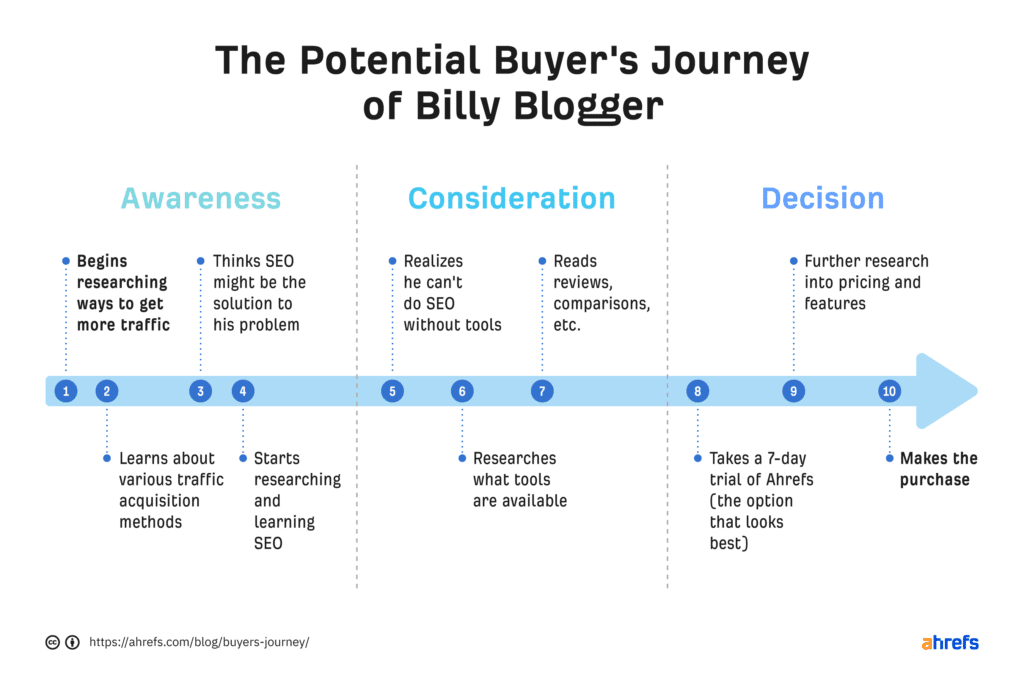
Budget
The lowest recommended daily Google Ads budget is $10. On a 30-day basis, you’ll have to spend at least $300 per month. Keep in mind that such a low budget may only generate poor leads or no leads at all, so consider your Google Ads spend carefully.
How Does Industry Affect the Cost and Effectiveness of Google Ads?
Another factor to consider is the average CPC in your industry. If you’re in finance, your leads cost – a lot. The deal values are higher, as well, so a nominal acquisition cost of $500 might not even be that much, provided that that lead generates $5000 in revenue.
On the other hand, eCommerce Google Ads come with a lower Cost Per Click because the product and sale values are much lower.
There are ways to optimise your budget down the line, especially once you get conversion cost data, but you’ll initially have to let Google Ads learn more about your campaigns. And that requires a testing budget.
I recommend planning for at least $1,000/month.
Learn more: Calculate your budget before you launch with the Google Ads Cost Estimator
How to Keep Your Google Ads Campaigns Cost-Effective
When you’ve understood your conversion rates and acquisition costs, as well as optimised your campaigns, consider Smart Bidding strategies like Target CPA or manually adjust your keyword bids based on each keyword’s performance.
If you’ve run Google Ads campaigns for traffic, consider how you’ll convert it. For example, in the B2B and SaaS sectors, the purchasing cycles can be quite long – it’s very hard to get the whole buying committee to convert on their first visit.
However, you can run cost-effective remarketing campaigns to get them to finalise their purchases.
Bonus: Bidding in the Time of Crises, or: How Economic Trends Influence Your Google Ads
In times of crisis, the first thing businesses switch off is paid advertising. In practice, this means that you get less competition on PPC channels like Google Ads, LinkedIn, or Meta Advertising, and more exposure to your target audience.
If possible, you can increase your ad spend to capture more market share when your competitors pull back.
On the other hand, be aware of the economic trends on the purchasing side and adapt your Google Ads accordingly. For example, if consumer spending has gone down in your industry, it’s smart to start promoting your lower-cost products or perhaps pack more value into your high-ticket ones so people get even more value for every penny spent.
Acquisition Costs
Finally, consider your lead and customer acquisition costs.
Getting the lead to click on your ad is just the first step – what else do you have to do to convert them based on your previous experience, and how much does that cost?
When implemented by a Google Ads expert, Google Ads are profitable. However, it’s crucial to understand how much you’re paying for acquisitions and how the cost of Google Ads factors into the equation.
How Do Other Marketing Channels Impact the Effectiveness of Your Google Ads?
Google Ads doesn’t have conflicts with the rest of your marketing channels. In fact, it can strengthen them – or be strengthened by them.
For example, Google Ads can make your brand more visible, making it more likely that people will click on your organic search results or social media posts simply because you’re becoming a known name to them. Alternatively, Google Ads can help you discover new keywords worth targeting with your organic content, especially if they’re earlier in the funnel.
And once you’ve set up your ads for the top or middle of the funnel, you can use email marketing to build lead nurture flows and stimulate those conversions for high-quality leads!
You can also use Google Ads to reach audiences that have already visited your site and place special offers in front of them through remarketing.
The Verdict: Are Google Ads Worth It?
Google Ads are worth it, but you should carefully consider the pros, cons, and acquisition costs to identify the best approach. Start with your goals and in-depth audience knowledge; it’ll be simpler to map the conversion journey to the correct Google Ads touchpoints.
So, ask yourself:
- Do I have the budget to get started with Google Ads?
- Do I understand my ideal customers well enough to know how to reach them with Google Ads campaigns?
If you’ve answered “yes” to both, congratulations!
Now, all you need to do is pick up the Google Ads knowledge you need to build, optimise, and scale a campaign that converts.
If you need assistance, get in touch with me. With over 15 years of Google Ads management experience, I’d love to help you!
But if you’d prefer to learn how to make Google Ads work for your business first-hand, grab a copy of my best-selling Google Ads book that will help you build a profitable campaign in 7 rapid steps.


